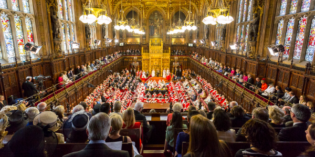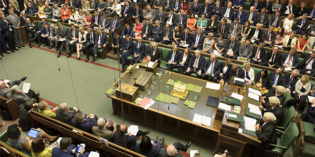Achieving accountable government

When parliaments’ second chambers are reformed and the implications for democracy
In recent years there have been several attempts by Western European governments to reform second chambers, including in the UK, though the majority of proposals have failed to pass. Michelangelo Vercesi assesses the conditions when such reforms are proposed, and finds that they are often instigated during times of democratic strain when the governing party wishes to reduce the number of veto players. However, the reforms tend to fail when there is not a broad consensus for the proposals, which has implications for considering when a democracy is able to instigate reforms.

Is it too late to stop a no deal Brexit?
It has been suggested Boris Johnson could bypass Parliament’s opposition to a no deal Brexit by timing a general election so Parliament was not sitting over the 31 October deadline. David Howarth explains what procedures could be used to avoid this, if politicians are determined to stop no deal.

Evidence from Germany: what citizens want from democracy
Although democracy is viewed positively across Europe, surprisingly little is known about the type of democratic processes citizens support. Drawing on new research in Germany, Saskia Goldberg, Dominik Wyss and André Bächtiger illustrate that disenchanted citizens want stronger involvement in political decision-making, irrespective of the concrete participation format.

Improving access to information and restoring the public’s faith in democracy through deliberative institutions
Advocates for public deliberation claim that increased citizen involvement in political decision-making can improve democratic governance. Studies have shown that deliberation can be beneficial for participants, but less is known about its impact on the wider public. Looking at the case of Citizens’ Initiative Reviews in Oregon, Katherine R. Knobloch shows that knowing about or using the information provided by deliberative institutions can improve the public’s faith in self-government.

Evidence from Australia: women are under-represented in senior political appointments, and this affects the representation of women in parliament
Political advisers can help shape public policy. They are also often the politicians of the future, so it matters who they are. Using a unique data resource from Australia, Marija Taflaga and Matthew Kerby tracked men’s and women’s differing career trajectories in Australian government over time, and found that men were more likely to reach senior levels, and then more likely to enter parliament.

Does the House of Commons have power without influence?
The impasse over the Withdrawal Agreement has highlighted the inability of the House of Commons to shape the substance of the Brexit deal. There is a growing sense of frustration at the apparent unwillingness of MPs to face up to the limited choices before them, writes Jack Simson Caird. A key lesson from the Article 50 process is that the UK needs a parliamentary system which is more oriented towards consensus and that is less adversarial, he concludes.

This government has already lost the confidence of the House of Commons: the response should be to replace the government, not to neuter parliament
The government and Parliament cannot agree how to proceed with Brexit. For some, the solution is for the government to prorogue Parliament and implement its Withdrawal Agreement without the confidence of the Commons. David Howarth argues that given the Fixed Term Parliament Act means a general election will not necessarily follow from such a loss of confidence, a new government formed by MPs from across the Commons is a viable option.

Political knowledge and populist attitudes influence voter preferences for government formation
Government formation in multiparty systems requires election losers to concede victory to the winners and, more often than not, winners to compromise to form a coalition government. Why will some voters concede victory to the winning party but others won’t? And what influences their openness to other parties during coalition talks? Looking at evidence from Austria, a multiparty system at the heart of Europe, Carolina Plescia and Jakob-Moritz Eberl find that, even after controlling for party preferences and ideology, political knowledge and populist attitudes are essential in explaining voters’ willingness or unwillingness to accept these fundamental prerequisites of coalition bargaining and political compromise.




 Democratic Audit's core funding is provided by the Joseph Rowntree Charitable Trust. Additional funding is provided by the London School of Economics.
Democratic Audit's core funding is provided by the Joseph Rowntree Charitable Trust. Additional funding is provided by the London School of Economics.